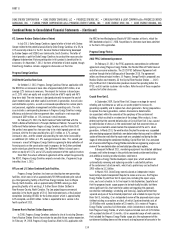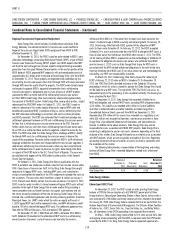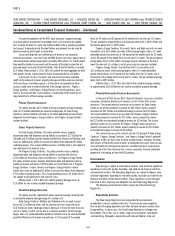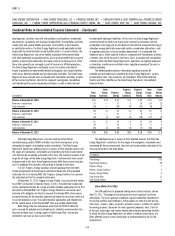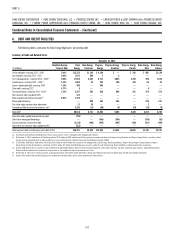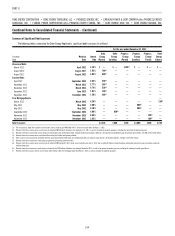Duke Energy 2012 Annual Report Download - page 164
Download and view the complete annual report
Please find page 164 of the 2012 Duke Energy annual report below. You can navigate through the pages in the report by either clicking on the pages listed below, or by using the keyword search tool below to find specific information within the annual report.
144
PART II
Combined Notes to Consolidated Financial Statements – (Continued)
DUKE ENERGY CORPORATION • DUKE ENERGY CAROLINAS, LLC • PROGRESS ENERGY, INC. • CAROLINA POWER & LIGHT COMPANY d/b/a PROGRESS ENERGY
CAROLINAS, INC. • FLORIDA POWER CORPORATION d/b/a PROGRESS ENERY FLORIDA, INC. • DUKE ENERGY OHIO, INC. • DUKE ENERGY INDIANA, INC.
local agencies, activities vary with site conditions and locations, remediation
requirements, complexity and sharing of responsibility. If remediation activities
involve joint and several liability provisions, strict liability, or cost recovery
or contribution actions, the Duke Energy Registrants could potentially be held
responsible for contamination caused by other parties. In some instances, the
Duke Energy Registrants may share liability associated with contamination
with other potentially responsible parties, and may also benefi t from insurance
policies or contractual indemnities that cover some or all cleanup costs. All of
these sites generally are managed as part of business or affi liate operations.
The Duke Energy Registrants continually assess the nature and extent of
known or potential environmentally related contingencies and record liabilities
when losses become probable and are reasonably estimable. The Duke Energy
Registrants have accrued costs associated with remediation activities at some
of their current and former sites for the stages of investigation, remediation
and monitoring that can be reasonably estimated, as well as other relevant
environmental contingent liabilities. At this time, the Duke Energy Registrants
cannot estimate the total costs that may be incurred in connection with the
remediation of all stages of all sites because the extent of environmental impact,
allocation among potentially responsible parties, remediation alternatives, and/
or regulatory decisions have not yet been determined. It is anticipated that
additional costs, which could be material, associated with remediation activities
at certain sites will be incurred in the future. Costs associated with remediation
activities within the Duke Energy Registrants’ operations are typically expensed
as Operation, maintenance and other unless regulatory recovery of the costs is
deemed probable.
The following table contains information regarding reserves for
probable and estimable costs related to the Duke Energy Registrants’ various
environmental sites. These amounts are recorded in Other within Deferred
Credits and Other Liabilities on the Duke Energy Registrants’ Consolidated
Balance Sheets.
(in millions)
Duke
Energy
Duke
Energy
Carolinas
Progress
Energy
Progress
Energy
Carolinas
Progress
Energy
Florida
Duke
Energy
Ohio
Duke
Energy
Indiana
Balance at December 31, 2009 $ 65 $ 13 $ 42 $13 $ 29 $ 20 $15
Provisions / adjustments 37 — 21 3 18 39 (2)
Cash reductions (14) — (28) (4) (24) (9) (2)
Balance at December 31, 2010 88 13 35 12 23 50 11
Provisions / adjustments 6 — 10 1 9 5 1
Cash reductions (33) (1) (22) (2) (20) (27) (3)
Balance at December 31, 2011 61 12 23 11 12 28 9
Provisions / adjustments 39 1 19 5 14 5 3
Cash reductions (25) (1) (9) (2) (7) (18) (4)
Balance at December 31, 2012 $ 75 $ 12 $ 33 $14 $ 19 $ 15 $ 8
The Duke Energy Registrants’ accruals relate to certain former
manufactured gas plants (MGP) and other sites that have required, or are
anticipated to require, investigation and/or remediation. The Duke Energy
Registrants could incur additional losses in excess of their recorded reserves for
the stages of investigation, remediation and monitoring for their environmental
sites that can be reasonably estimated at this time. The maximum amount of the
range for all stages of the Duke Energy Registrants’ environmental sites cannot
be determined at this time. Actual experience may differ from current estimates,
and it is probable that estimates will continue to change in the future.
In 2012, Progress Energy Carolinas received approval from the North
Carolina Department of Environment and Natural Resources of the remedial
action plan for its remaining MGP site. Progress Energy Carolinas has accrued
the estimated cost for this remedial action plan.
At December 31, 2012, Progress Energy Florida’s accrual primarily relates
to an MGP site located in Orlando, Florida. In 2012, the potentially responsible
parties received estimates for a range of viable remedial approaches for the fi rst
phase of the Orlando MGP site. Progress Energy Florida has accrued its best
estimate of its obligation for the fi rst phase of the Orlando MGP site based on
current estimates for the remedial approach considered to have more merit and
its current allocation share. The viable remedial approaches and related costs
for the second phase at the Orlando MGP site have not been determined.
Duke Energy Ohio has received an order from the PUCO to defer the
costs incurred for probable and estimable costs related to environmental sites.
Recovery of those costs is being sought in Duke Energy Ohio’s natural gas
distribution rate case as discussed in Note 4.
The additional losses in excess of their recorded reserves that the Duke
Energy Registrants’ could incur for the stages of investigation, remediation and
monitoring for their environmental sites that can be reasonably estimated at this
time are presented in the table below.
(in millions)
Duke Energy $92
Duke Energy Carolinas 28
Progress Energy 7
Progress Energy Carolinas 3
Progress Energy Florida 4
Duke Energy Ohio 51
Duke Energy Indiana 5
Clean Water Act 316(b).
The EPA published its proposed cooling water intake structures rule on
April 20, 2011. The proposed rule advances one main approach and three
alternatives. The main approach establishes aquatic protection requirements
for existing facilities that withdraw 2 million gallons or more of water per day
from rivers, streams, lakes, reservoirs, estuaries, oceans, or other U.S. waters
for cooling purposes. Based on the main approach proposed, most, if not all
of the coal, natural gas and nuclear-fueled steam electric generating facilities
in which the Duke Energy Registrants are either a whole or partial owner are
likely affected sources unless retired prior to implementation of the 316(b)
requirements.


